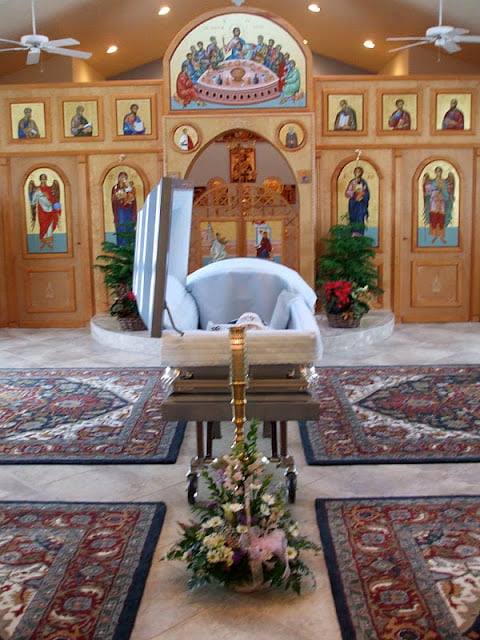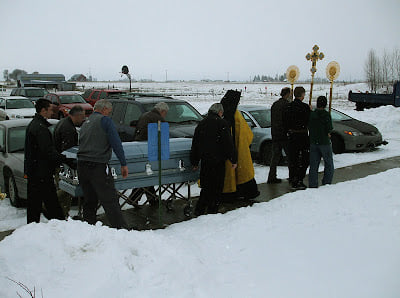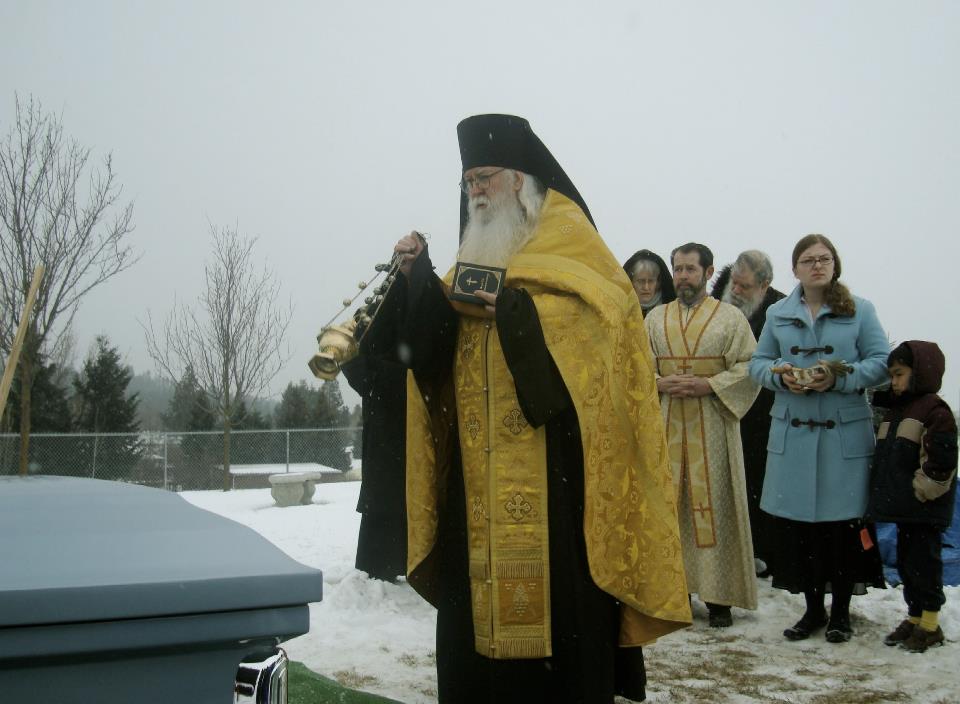Cremation Versus The Orthodox Practice Of Burial

The first time I ever attended a funeral service where cremation of the body of the deceased had taken place was in Portland, Oregon, many years ago. An Episcopal priest friend had died and had requested his body be cremated. Walking into the church and seeing a small box sitting before the altar was a shock for me. Cremation was always something only non-believers practiced, whereas Christians have always viewed cremation as something of pagan roots. I clearly remember feeling cheated out of that last goodbye, unable as I was to view my friend for one last time.
In ancient times pagans always either burned the bodies of their dead, or left them for birds to consume, whereas Jews and Christians placed their dead in tombs, or in the earth, awaiting the bodily resurrection. For Christians the belief that the body is the temple of the Holy Spirit and therefore sacred, made the burning of the body unacceptable. Bodies of our dead were always to be treated with great reverence. From the earliest of times the bodies of the martyrs and saints were buried in the catacombs, their tombs used as altars for the celebration of the Eucharistic offering, catacombs often being the only safe place for believers to worship without threat of arrest.
One of my earliest memories was going to a family plot in Spokane, WA. with my maternal grandmother. She would lay flowers on the graves of her loved ones, family members who were long dead before I was even born. Even though many had been gone from this life for a few generations, to my grandmother, they were still alive. She would sit on a tombstone, flowers in hand, and tell me about her sisters, her parents, and other family members. Her shared memories were made all the more real seeing the names of these loved ones chiseled in stone.
The ritual of visiting graves was common back in those days, with families keeping the memories alive, while showing their love and respect for their dead relatives by tending to the graves, and leaving flowers. It was even quite common, especially in Western Europe, for friends and families to take picnics to graveyards.
There is also the role cemeteries can play in our own spiritual lives, for they are clear reminders of our own mortality. I have already picked the plot where my own remains will be placed on the grounds of our monastery. Seeing where one will eventually be laid to rest is a good way to remember one’s own eventual death, reminding ourselves of our own mortality, and to use our remaining days wisely.
The Orthodox Church forbids the cremated remains of anyone to be brought into the temple for services, or for any other reason, and funeral services over cremated remains is strictly forbidden. The practice is seen as a denial of the bodily resurrection, not because God can’t raise the dead from the ashes, but because the practice does not reflect the Church’s teaching that the body of a believer housed the Holy Spirit. It is also ignoring the fact that believers receive, in their lifetime, the very Body and Blood of Christ, and the body is therefore made holy in preparation for that day when we shall be united in both body and soul, to live forever with God.
My parents converted to Orthodoxy in their mid seventies and are buried in the church yard next to Saint John the Baptist Church in Post Falls, Idaho. Having them in an Orthodox cemetery, side by side, means a lot to me, and I visit their graves whenever I am in Northern Idaho on visits to my brother. Having a plot to visit continues that connection and allows me a chance to show my love for them by placing flowers on their graves, as I offer prayers for their souls. It saddens me that so many people have deprived themselves of such moments, having spread their loved one’s ashes over golf courses or on beaches. The loss of family cemeteries has contributed, I am convinced, to the breakdown of the all important extended families that were at one time so important to the cohesiveness of family values.
For those who would say that cremation is more ecologically sound, I would point out that the particles dispersed in the atmosphere are by no means good for the environment. A new way of burial, known as green burial, is gaining popularity throughout the country and is far more ecologically sound than cremation. Green burials require a simple pine coffin with no metal, nails or glue, using only wooden pegs and natural materials. The body is not embalmed (in keeping with Orthodox tradition), so nothing goes into the earth that is not natural. This is one of the most inexpensive ways of internment and is in keeping with the canons of the Orthodox Church. This is the way my own body will be laid to rest.
With love in Christ,
Abbot Tryphon

Photos: The burial of my beloved mother Dolores, (Elizabeth in Orthodoxy).

Friday February 24, 2023 / February 11, 2023
Week of the Last Judgment. Tone three.
Maslenitsa. Meat is excluded
Hieromartyr Blaise, bishop of Sebaste (316).
St. Vsevolod (in holy baptism Gabriel), prince and wonderworker of Pskov (1138).
Venerable Demetrius, monk of Priluki (Vologda) (1392).
Venerable Cassian the Barefoot (in the world ‘Kosmas’), ascetic of the Joseph-Volokolamsk Monastery (1532)
St. Theodora, wife of Emperor Theophilus the Iconoclast (867).
St. Gobnait, abbess of Ballyvourney, Cork (Ireland) (7th c.) (Celtic & British).
Venerable Caedmon of Whitby, monk (680) (Celtic & British).
Venerable George (Kratovac) the Greatmartyr of Serbia (Greek).
Hieromartyr Lucius of Adrianopolis in Thrace (348).
St. Benedict of Aniane (821) (Gaul).
The Scripture Readings
Zechariah 8:7-17
7 “Thus says the Lord of hosts:
‘Behold, I will save My people from the land of the east
And from the land of the west;
8 I will bring them back,
And they shall dwell in the midst of Jerusalem.
They shall be My people
And I will be their God,
In truth and righteousness.’
9 “Thus says the Lord of hosts:
‘Let your hands be strong,
You who have been hearing in these days
These words by the mouth of the prophets,
Who spoke in the day the foundation was laid
For the house of the Lord of hosts,
That the temple might be built.
10 For before these days
There were no wages for man nor any hire for beast;
There was no peace from the enemy for whoever went out or came in;
For I set all men, everyone, against his neighbor.
11 But now I will not treat the remnant of this people as in the former days,’ says the Lord of hosts.
12 ‘For the seed shall be prosperous,
The vine shall give its fruit,
The ground shall give her increase,
And the heavens shall give their dew—
I will cause the remnant of this people
To possess all these.
13 And it shall come to pass
That just as you were a curse among the nations,
O house of Judah and house of Israel,
So I will save you, and you shall be a blessing.
Do not fear,
Let your hands be strong.’
14 “For thus says the Lord of hosts:
‘Just as I determined to punish you
When your fathers provoked Me to wrath,’
Says the Lord of hosts,
‘And I would not relent,
15 So again in these days
I am determined to do good
To Jerusalem and to the house of Judah.
Do not fear.
16 These are the things you shall do:
Speak each man the truth to his neighbor;
Give judgment in your gates for truth, justice, and peace;
17 Let none of you think evil in your heart against your neighbor;
And do not love a false oath.
For all these are things that I hate,’
Says the Lord.”
Zechariah 8:19-23
19 “Thus says the Lord of hosts:
‘The fast of the fourth month,
The fast of the fifth,
The fast of the seventh,
And the fast of the tenth,
Shall be joy and gladness and cheerful feasts
For the house of Judah.
Therefore love truth and peace.’
20 “Thus says the Lord of hosts:
‘Peoples shall yet come,
Inhabitants of many cities;
21 The inhabitants of one city shall go to another, saying,
“Let us continue to go and pray before the Lord,
And seek the Lord of hosts.
I myself will go also.”
22 Yes, many peoples and strong nations
Shall come to seek the Lord of hosts in Jerusalem,
And to pray before the Lord.’
23 “Thus says the Lord of hosts: ‘In those days ten men from every language of the nations shall grasp the sleeve of a Jewish man, saying, “Let us go with you, for we have heard that God is with you.” ’ ”
